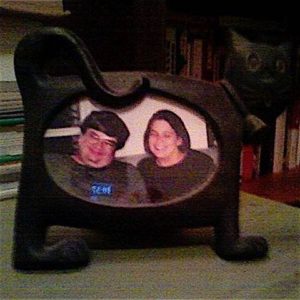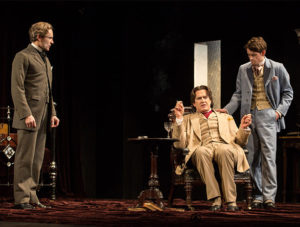 An expatriate friend whom I haven’t seen for years recently sent me a present, a pair of tiny crystal flamingos that she intended as symbols of my marriage to Mrs. T. I was amazed—the two of us had been out of touch for longer than I can remember—and touched almost beyond words by so elegant a gesture. But it also made me sad, for I used to see my old friend quite often when she lived in New York, and her departure left a hole in my life.
An expatriate friend whom I haven’t seen for years recently sent me a present, a pair of tiny crystal flamingos that she intended as symbols of my marriage to Mrs. T. I was amazed—the two of us had been out of touch for longer than I can remember—and touched almost beyond words by so elegant a gesture. But it also made me sad, for I used to see my old friend quite often when she lived in New York, and her departure left a hole in my life.
Unless you live in a very small town, every middle-aged life is full of friend-sized holes. Some, of course, are dug by death, but more arise from the routine friction of everyday existence and the fact that America is a really big country. I’m no longer close to the friends of my childhood and adolescence, though I always delight in seeing them on the rare occasions when our paths cross. As for the people whom I knew in college, it is only because of the social media and my work as a drama critic and playwright, which takes me all over the country, that I have much contact with any of them, even the ones I loved most.
Nor do I see other than sporadically more than one or two of the friends whom I made when I first moved to New York in 1985. Many of them later got married and started families, which soon put them out of reach, there being nothing so all-consuming as raising children. Others left town, and a few simply dropped out of sight, never to resurface. In due course, though, I replaced them, and so it is that all but a handful of the people whom I now see most regularly have entered my life in the course of the past decade.
I blogged about the difference between old and new friends back in 2004, and I feel even more strongly now what I already sensed back then:
The one thing a new friend can never do for you is say I knew you when, and I find it rather sad that there are so few people in my life who can speak those words. None of my closest friends in Manhattan knew me when: we didn’t meet until after I’d figured out who I was and what I wanted to become. On the other hand, the friends of our youth present their own problems. They are part of the train of memories that we all pull behind us, the one that grows longer with each passing day, and for that reason harder to pull….Old friends knew you when, but new ones know you now, and now is when it is and where you are.
 Fortunately, I do have my beloved Our Girl in Chicago, whom I met a quarter-century ago and with whom I have been the very best of friends ever since. Only an act of mutual resolve kept the two of us from growing apart after she moved from New York to Chicago—in fact, we grew even closer—but the result of that joint effort is that our friendship has become, after my marriage, the most intimate and important relationship of my life that does not entail consanguinity. It was Our Girl who taught me that the love of old friends is like compound interest, or a good wine: it just gets better and better.
Fortunately, I do have my beloved Our Girl in Chicago, whom I met a quarter-century ago and with whom I have been the very best of friends ever since. Only an act of mutual resolve kept the two of us from growing apart after she moved from New York to Chicago—in fact, we grew even closer—but the result of that joint effort is that our friendship has become, after my marriage, the most intimate and important relationship of my life that does not entail consanguinity. It was Our Girl who taught me that the love of old friends is like compound interest, or a good wine: it just gets better and better.
As for my other friends who have slipped into the wings, I miss some of them very much, including the woman who sent me the flamingos that I have put in a place of honor on a bookshelf in the living room of the Manhattan apartment that I share with Mrs. T. But there are only so many hours in a day, and at sixty you become aware with steadily increasing clarity that there are also only so many days in a lifetime. Such being the regrettable case, I endeavor insofar as I can to live in the present, taking my cue from George Balanchine, whose attitude I described in my little book about his life and work:
Having come so close to death at so young an age, he determined instead to spend the rest of his days living in the present. It was a resolution from which he never wavered. Of all his oft-repeated refrains, the most familiar was Do it now! “Why are you stingy with yourselves?” he would ask his dancers. “Why are you holding back? What are you saving for—for another time? There are no other times. There is only now. Right now.” His ruthlessly practical approach to running a dance company was rooted in the hard-won knowledge that his next breath might be his last. He worked within the means available at the moment, using them to the fullest, never wasting time longing for better dancers or a bigger budget…He ran his private life along the same lines: when he had money, he spent it lavishly, on himself and others, and when he didn’t, he lived frugally. “You know,” he said, “I am really a dead man. I was supposed to die and I didn’t, and so now everything I do is second chance. That is why I enjoy every day. I don’t look back. I don’t look forward. Only now.” This dance, this meal, this woman: that was his world.
 Yet sometimes—fairly often, truth to tell—I do look back, for the most part not regretfully but wistfully, since I have led a (mostly) happy life and known and loved many wonderful people. On occasion I even catch myself wishing that they all lived in my neighborhood, and that we could see one another as often as we liked. Alas, I know that were it so, I wouldn’t have nearly enough time to pay any one of them the attention she deserved.
Yet sometimes—fairly often, truth to tell—I do look back, for the most part not regretfully but wistfully, since I have led a (mostly) happy life and known and loved many wonderful people. On occasion I even catch myself wishing that they all lived in my neighborhood, and that we could see one another as often as we liked. Alas, I know that were it so, I wouldn’t have nearly enough time to pay any one of them the attention she deserved.
To everything, it seems, there is a season—including friendships. Some are for youth, others for the middle of the journey. But save in memory, only a precious few can be for always. Life sees to that.
* * *
George Hearn, Carol Burnett, John Barrowman, Ruthie Henshall, and Bronson Pinchot sing Stephen Sondheim’s “Old Friends,” from Merrily We Roll Along:




 So why is it now playing at Brooklyn’s BAM Harvey Theater? Because the successful 2012 London revival, of which this production is a belated transfer, starred Rupert Everett, who was universally regarded as ideal for the part. And so he is: Mr. Everett’s performance is a creative impersonation of breathtaking authority, one that flirts with exaggeration but never crosses the line into caricature….
So why is it now playing at Brooklyn’s BAM Harvey Theater? Because the successful 2012 London revival, of which this production is a belated transfer, starred Rupert Everett, who was universally regarded as ideal for the part. And so he is: Mr. Everett’s performance is a creative impersonation of breathtaking authority, one that flirts with exaggeration but never crosses the line into caricature….